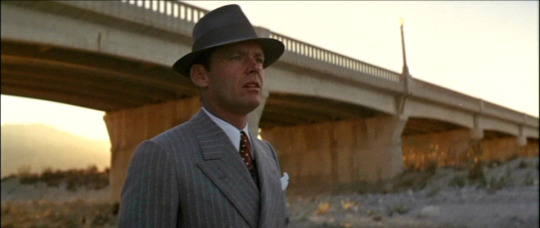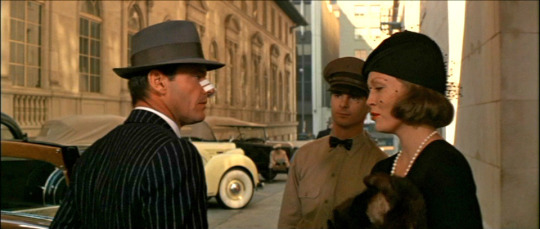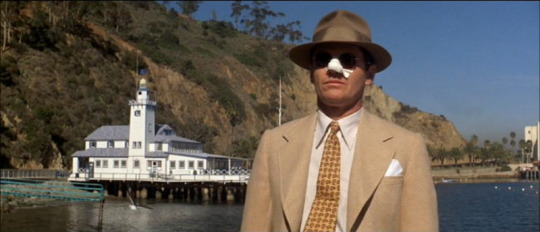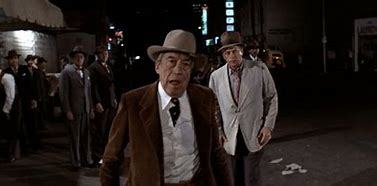#Surely there should also be a category for hired agents and spies right
Text
Game Concept: Chess. But there is a third player with pieces called Mercanaries, which can work to either help one side or the other (or even be double agents) or attempt to capture a king for themselves to win the game.
#Just... ya know. If there are kings and queens and knights and rooks and pawns#Surely there should also be a category for hired agents and spies right??#Asians posing as bishops infiltrating the others domain#Edit: That is supposed to say ASSASSINS not asians tsjtdjydkfykf#I just think itd be cool to be able to have a third player causing chaos by 'helping' one side#And like.... the two 'main' players could try to bride them and add them into their strategy#Board games#Chess#Game ideas
34 notes
·
View notes
Text
Chinatown (1974); AFI #21




The next movie that we reviewed was a very dark example of neo-noir film directed by Roman Polanski, Chinatown (1974). This film was a throwback to very dark crime thrillers that reflected the outlook of a Great Depression followed by world war. Polanski was experiencing a very dark period since he had just moved to America to get married and immediately lost his wife and unborn son in a horrific murder. The film was well received by critics and audiences, but it could not stand against the award winning juggernaut which was The Godfather Part 2. Polanski’s film was nominated for 11 Academy awards but only took one home for best original screenplay, a category that didn’t include The Godfather Part 2. It is hard to describe how incredibly down beat this film is without spoiling too early, so let me give the breakdown with the standard warning:
SPOILER ALERT!!! THIS IS A MURDER MYSTERY SO THE PLOT IS ABOUT TO BE WELL SPOILED!!! IF YOU WANT TO SEE THE FILM FIRST, NOW IS THE TIME TO STEP AWAY!!! COME BACK AFTER YOU SEE THE FILM!!!
-----------------------------------------------------------------------------
In 1937, a woman identifying herself as Evelyn Mulwray hires private investigator J. J. "Jake" Gittes (Jack Nicholson) to follow her husband, Hollis Mulwray, the chief engineer at the Los Angeles Department of Water and Power. Gittes tails him, hears him publicly refuse to create a new reservoir that would be unsafe, and shoots photographs of him with a young woman, which are published on the front page of the following day's paper. Back at his office, Gittes is confronted by a woman who informs him she is the real Evelyn Mulwray (Faye Dunaway) and that he can expect a lawsuit.
Realizing he was set up, Gittes assumes that Hollis Mulwray is the real target. Before he can question him, Lieutenant Lou Escobar fishes Mr. Mulwray, drowned, from a reservoir. Under retainer to Mrs. Mulwray, Gittes investigates with suspicions of murder and notices that although there is a drought, huge quantities of water are being released from the reservoir every night. Gittes is warned off by Water Department Security Chief Claude Mulvihill and a henchman (Roman Polanski) who slashes one of Gittes' nostrils. Back at his office, Gittes receives a call from Ida Sessions, who identifies herself as the imposter Mrs. Mulwray. She is afraid to identify her employer but tells Gittes to check the day's obituaries.
Gittes learns that Mulwray was once the business partner of Evelyn's wealthy father, Noah Cross (John Huston). Over lunch at his personal club, Cross warns Gittes that he does not understand the forces at work, and offers to double Gittes' fee to search for Mulwray's missing mistress. At the hall of records, Gittes discovers that much of the Northwest Valley has recently changed ownership. Investigating the valley, he is attacked by angry landowners who believe he is an agent of the water department attempting to force them out by sabotaging their water supply.
Gittes deduces that the water department is drying up the land so it can be bought at a reduced price and that Mulwray was murdered when he discovered the plan. He discovers that a recently deceased retirement home resident is one of the valley's new landowners and seemingly purchased the property a week after his death. Gittes and Evelyn bluff their way into the home and confirm that the real-estate deals were surreptitiously completed in the names of several of the home's residents. Their visit is interrupted by the suspicious retirement-home director, who has called Mulvihill.
After fleeing Mulvihill and his thugs, Gittes and Evelyn hide at Evelyn's house and sleep together. During the night, Evelyn gets a phone call and must leave suddenly; she warns Gittes that her father is dangerous. Gittes follows Evelyn's car to a house, where he spies her through the windows comforting Mulwray's mistress, Katherine. He accuses Evelyn of holding the woman against her will, but she says Katherine is her sister.
The next day, an anonymous call draws Gittes to Ida Sessions' apartment, where he finds her murdered and Escobar waiting for Gittes' arrival. Escobar tells him the coroner's report found salt water in Mulwray's lungs, indicating that he did not drown in the fresh water of the reservoir. Escobar suspects Evelyn of the murder and tells Gittes to produce her quickly. At Evelyn's mansion, Gittes finds her servants packing her things. He realizes her garden pond is salt water and discovers a pair of bifocals in it. He confronts Evelyn about Katherine, whom Evelyn now claims is her daughter. After Gittes slaps her (a lot), she tells him that Katherine is her sister and her daughter; her father raped her when she was 15. She says that the glasses are not Mulwray's, as he did not wear bifocals.
Gittes arranges for the women to flee to Mexico and instructs Evelyn to meet him at her butler's home in Chinatown. He summons Cross to the Mulwray home to settle their deal. Cross admits his intention to annex the Northwest Valley into the City of Los Angeles, then irrigate and develop it. Gittes accuses Cross of murdering Mulwray. Cross has Mulvihill take the bifocals at gunpoint, and they force Gittes to drive them to the women. When they reach the Chinatown address, the police are already there and detain Gittes. When Cross approaches Katherine, Evelyn shoots him in the arm and starts to drive away with Katherine. The police open fire, killing Evelyn. Cross clutches Katherine and leads her away, while Escobar orders Gittes released. Lawrence Walsh, one of Gittes' associates, tells him: "Forget it, Jake. It's Chinatown."
-----------------------------------------------------------------------------
I really cannot emphasize how much of a bummer ending this film has. It is right up there (down there) with Sophie’s Choice. A man who pays to dump water so that he can purchase cheap farm land, kills his partner who threatens to tell, and rapes his own 15-year-old daughter is the antagonist. In the end, he is released to take custody of his young granddaughter without punishment after the police shoot the daughter that he raped. The investigator who tried to help and solved the mystery is left with no say and a slit nostril for his troubles. Polanski later said in interviews that he wanted to emphasize the futility of trying to find justice in Los Angeles. Both his life and this movie really proved that as a fact. It is funny that the screenwriter who won the academy award wanted Cross to die and Evelyn to live, but Polanski insisted and the dark tone is what pushed the award in their favor.
There was some discussion about finding an actor that was willing to be the lead with a bandaged face or prosthetic injury for most of the movie. It was still all about face time and dialogue, so most lead actors didn’t want to cover up their face. Nicholson was not actually known for his good looks as much as other actors, so he was more willing to take on the role. Actually, it was Nicholson who wanted to work on a project with Polanski and suggested the script in the first place. Also, Nicholson really connected with Polanski at the time and was not afraid to play dark roles. Jon Huston was not as keen on the heavy pedophile incest role since he had a lovely young daughter of his own (actress Angelica Huston). It turned out to be a good choice for all the actors involved.
Something that came up during the viewing with my housemates was reactions to the scene when Jack Nicholson is slapping Faye Dunaway when she is admitting that the girl she visits is both her sister and her daughter. She keeps alternating between “she’s my sister” and “she’s my daughter” and each statement is punctuated with a slap in the face by Jack Nicholson. It is supposed to be deeply serious and a major reveal in the movie, but we were laughing so hard at the absurdity. It was truly unrealistic and more of a trope of film noir than anything else (slapping a hysterical woman). It truly was a throwback to 40s and 50s style Hollywood and some of the standards of film story telling at that time were a bit silly.
I have reviewed this move in more ways than I thought because I realized on this viewing that the video game L.A. Noir borrows very heavily from this film. So many aspects, from the locations to the situations to the soundtrack, were all put into the video game. I have spent many hours of my life playing through that game a number of times and I am shocked each time. I am curious if Rockstar Games had to pay any money to Roman Polanski for such a close similarity to the film? I tried to look it up but didn’t find anything, so probably not.
So should this film by on the AFI to 100? For sure. It is an Old Hollywood story about even older Hollywood. It stands out as one of the darkest endings that I have ever experienced. It has major star power and surrounded by amazing stories of Hollywood. Would I recommend it? I sure would. It is a great trip around old Hollywood with some of America’s greatest actors. I think just as interesting is the story of Roman Polanski (who I did an article on as well) and why his head space was so dark during the production of this film. Definitely worth a watch and a background deep dive.
#introvert#introverts#chinatown#jack nicholson#faye dunaway#roman polanski#movie review#top 100#70s#Film Criticism
15 notes
·
View notes
Text
Macgyver 2016: Why Reboot!Jack Dalton is WAAAY more messed up than he appears to be on the show (Updated to include up to the Season 2 finale)
At first, second and third glance, Reboot!Jack Dalton seems like the human version of a golden retriever - loud, fun, kind of dumb and incredibly persistent. The writers certainly like to play up that angle, sometimes to the point of parody.
But there’s also this vague, persistent sense throughout the show that Jack is convinced he’s Not A Good Person. He was convinced that the breakup with Sarah was his fault, though I don’t remember him ever being able to point to a specific reason why, and it’s straight-up canon that he actively fled from Riley and her mom because he was convinced they’d be horrified that he beat up her abusive dad. You don’t immediately jump to that extreme a reaction unless you’ve got a lot of shame you’re carrying around. They’ve tried to avoid bringing it up as much as possible in season 2, but even then the writers have never really been able to shake the feeling. You could even argue that the extremely weird on-again, off-again thing with the con is proof that’s all he thinks he’s good for. And that’s not even including the undertone in a lot of the action scenes, where despite his complaining it’s hard not to notice that he seems to think of himself as disposable on some level.
For the longest time, it completely baffled me. How could he POSSIBLY see himself as anything but the goofball he tries to hard to be?
But… well, think about just how hard he tries to be that goofball. He throws himself into it with a dedication you’d expect from a college-age stoner, which made me start thinking about WHY he tries that hard. We know from the high school reunion episode that Jack has a deep, fierce need to be liked, but a goofball isn’t the most generally accepted personality out there (and we have canon proof that he drives plenty of people absolutely nuts with it). Why not go for a more generally appealing persona, if he really wants to be liked that badly?
And then you think about his canon resume, which includes time in Delta and several years as a CIA agent. More importantly, he seemed to be pretty darn good at both. He joined the CIA after his stretch in Delta, aka Army Special Forces (the show hasn’t stated that specifically, but it’s not an uncommon jump. Also, he was older in the CIA, and recently enough that he wouldn’t have time to qualify for Delta). Delta might do black ops stuff, but it's not exactly the kind that would give you the exact skills the CIA would be looking for. He must have distinguished himself pretty hard, and in very specific non-traditionally Delta ways, to be considered a worthy candidate.
As for his CIA record, I look to the fact that Matty, who complains about every single other thing about him she can, has never questioned his ability to do his job. She yells about his recklessness, his unwillingness to follow rules, his impulsiveness, but she’s never once called him a bad agent. Since Matty was his supervising officer during the Incident that caused him to no longer be in the CIA, it suggests to me that whatever happened wasn’t because he screwed up. Also, he must have had a pretty darn good record for the higher ups to let Mac Sr. add him to the Phoenix Foundation in the first place. The government, just like everyone else, doesn’t like hiring people who already left their employ in a spectacular fashion. The only possible reason they’d have let him back in at all is that he’s darn good at his job.
(Also, I think Matty must trust his skills enough to be the one to have mentioned his name to Mac Sr. in the first place. No matter what Mac Sr. implied, he's coolly logical and efficient enough I can't IMAGINE someone like Jack was his first choice for Mac's partner, successes be darned. He probably only took the suggestion after two or three of his candidates all went bust, and only told himself it was his genius plan all along when Mac and Jack refused to leave each other's side.)
So all evidence points to the fact that Jack Dalton was a Good Spy. And there’s one thing all Good Spies are good at - pretending to be something they’re not.
Because there are a few things that just don’t fit in with the goofball persona. That trick in 2x20, where Ethan led all the bad guys into one room with that heartbroken “plea” to his Dad? That was elegant, manipulative and a little bit ruthless, and more importantly it was clever in an “I understand people” rather than an “I understand science” way. Though he knows the inside of Jack’s head pretty well, the show has never given us any sign that Mac has any sort of real insight into how the majority of humans work (if anything, it’s shown us the opposite). So that part of the plan… well, it probably wasn’t Mac’s.
Then there’s that time Mac got arrested for supposedly killing that guy, and Matty’s most immediate priority was making sure Jack didn’t do anything super dangerous? And it wasn’t even in a whole “Jack, don’t do anything stupid” way. It was more of a “Jack, you’re not allowed to cause an international incident IN OUR BACKYARD” kind of way. And the way Jack looked so ANGRY, like he was seriously considering that international incident. Like, in his head at that moment, there wasn’t a lot of difference between the local cops and enemy soldiers.
And remember when he essentially offered up Jill and Riley’s dad as sacrificial lambs because he needed to get into Matty’s safe? Yes, he was offering them up to Matty, which meant their actual lives weren’t on the line. But the destruction of Jill’s career and Riley’s dad going back to prison were very real options if things didn’t go EXACTLY the way Jack wanted them to, and that fact didn’t seem to bother Jack all that much. Given how fiercely protective he is of HIS team (and how much he worries about them), it stood out.
And then there’s the ending of that episode, where the ONE painting that wasn’t crooked was the one hiding the safe. (This did indeed turn out to be bad writing, because no one who’d been a spy as long as Jack had would make such a rookie mistake. Given how “stellar” the writing the show has been at various other points -- I’m looking at you, the completely logic-defying resolution of the Nikki and Patricia plot lines -- it didn’t even surprise me.)
But still, how did she know it was Jack? He can't be the only person who'd want to get at her secrets, and given the level of security she would no doubt have on her own secrets it makes no sense that her immediate assumption that it was him would be a comment on his lack of intelligence. The most logical conclusion, then, is that he was that she knew he was one of a very small number of people GOOD enough to pull it off, and the most likely on that list.
The most interesting moment in this category, however, came in the finale. Remember when Matty basically told Jack "Hey, you also need to make sure you save Mac Sr."? It doesn't make any sense for her to have meant "You need to make sure you also save people who aren't Mac," because Jack does that anyway -- he gets to Mac, and then together they get everyone else out. It's literally their standard plan, and Matty knows it. It goes without saying that these two will do every single thing in their power to get everyone else out of danger.
So all I can think is that what Matty was *actually* saying was "If you're tempted to let Mac Sr. die for everything he's put Mac through, you should not do that." And after mentioning that the world needs Mac Sr., and Jack absolutely not responding to that at ALL, she throws in that he also saved her life a bunch of times. And it's that last bit that finally does indeed respond to in the affirmative, like it's a good thing for Mac Sr.'s health that there's one person Jack likes who he hasn't screwed over. Yes, he didn't get the chance to do anything about it, but Matty's warning (and the fact that she felt she needed to give him a warning) was 100 percent serious.
And let’s take a closer look at Jack’s timeline. Though we haven’t gotten specific dates, the logical order of various incidents suggest that beating up Riley’s abusive Dad and the Incident that caused him to part ways with the CIA couldn’t have been more than five or so years apart. Riley and her mom came first, since he was definitely still working for the CIA when he was with them. We’ve also seen signs of some of the ops Jack used to run with Matty that were deep cover enough, and long-term enough, there’s no way he could have maintained a cover as a tile salesman or a relationship with a civilian. Since we know Matty was definitely his supervisor at the end of his CIA career, it’s not ludicrous to say that Jack fled Riley and her mom and immediately ran into deep cover gigs.
And let’s look at what happened AFTER the CIA incident. There, the timeline is more firm - Mac’s military career has been canonically stated as running from 2009-2012, which means Jack also had to be back in the army sometime in 2011 to 2012. Which is a weird place for him to end up, looking at his resume. He wasn’t even back in Delta - he was with a group babysitting bomb techs, which as far as I can tell seems to be the army’s version of busy work. And yet, he had enough pull that he could state “I’ll only come back if you permanently assign me to this one guy” and they LET him. Army officials do not, as a rule, like it when random underlings tell them what to do (even with the persuasion of a creepily manipulative spy dad).
If Jack could choose to keep working with Mac, he probably had some choice in getting dropped into babysitting duty in the first place. And it hit me that, if you were a career fighter looking to spend a couple of years in a job where you could 1) cause the least amount of damage and 2) be certain you were doing the morally right thing the majority of the time, then babysitting bomb techs is a pretty smart place to park yourself. The army’s full of moral grays and blacks, but keeping alive the people who are keeping bombs from hurting other people is a pretty solid Good Guy gig.
Also, he clearly wasn’t looking to make a career out of it. Looking at Riley’s age and a few other checkpoints, Jack couldn’t have been on babysitting duty pre-Mac for more than a few years at most. And once he got sprung, he was going HOME. He was going back to Texas, and he was going to be DONE with the army and the CIA and shooting people and everything. He’d been in since just after high school, and he was SICK OF IT. Like he’d maybe spent a couple of years in the army to find his feet and get his head back on straight, but that was all it was.
That smells like burnout to me. Not just general burnout, but the kind where the person who’s flamed out Absolutely Does Not Want to Hurt People Anymore. Jack had spent his entire career in the Army Special Forces and the CIA, which meant that he’d spent most of his adult life dropped directly into the shittiest, most violent situations possible. Decades of hurting people, by that point, and by then you’d have to build up some kind of tolerance if you wanted to function at all. And yet, somehow, it got so bad that he flamed out dramatically enough to cause the Incident.
Given all that, I’m pretty sure I’d try like hell to convince everyone I was just a goofball, too.
195 notes
·
View notes